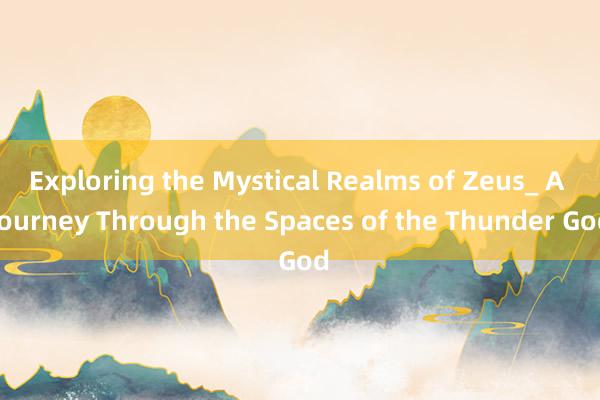Exploring the Mystical Realms of Zeus_ A Journey Through the Spaces of the Thunder God


The legend of Zeus, the omnipotent god of thunder, lightning, and the heavens, has captivated humankind for thousands of years. Known as the ruler of Olympus, Zeus's persona and powers have fascinated mythologists, historians, and storytellers alike. But what if we could explore "mga puwang ng Zeus"—spaces where his essence lingers, places that hold secrets of his powers and the timeless myths that surround him?
The phrase "mga puwang ng Zeus," which translates to "the spaces of Zeus," evokes a sense of reverence and awe. These "spaces" aren't limited to physical locations but encompass both realms within mythology and places in our world where his influence seems to linger. Whether through ancient ruins or through cultural symbols, Zeus’s presence continues to be a beacon of strength, wisdom, and divine justice. This two-part exploration delves into the mythical and symbolic significance of these spaces, imagining what they might represent to those who dare to walk in the shadow of the gods.
The Mythical Spaces of Zeus
In Greek mythology, Zeus holds a unique status among the gods. His spaces—Olympus, Mount Ida, and even the skies—are imbued with his essence. Olympus, the most revered of these, served as the residence of Zeus and his divine court. This mystical mountain was a place where only the worthy could set foot, and it was from here that Zeus wielded his iconic thunderbolt. The space of Olympus represented not only physical territory but also the seat of power over all creation and law.
The mythological spaces associated with Zeus were not just homes but symbols of his role as a protector, judge, and keeper of cosmic order. Take, for instance, Dodona, the ancient Greek sanctuary known for its oracle. Here, Zeus was worshiped through a sacred oak tree, which, according to legend, allowed him to communicate with the faithful through the rustling leaves. The space of Dodona signified a meeting ground between the mortal and divine, emphasizing Zeus’s role as a bridge between earthly concerns and celestial wisdom.
Beyond Olympus and Dodona, the skies and storms were also considered Zeus’s domain. In times of intense thunderstorms, ancient Greeks would look to the heavens, believing these natural phenomena were direct expressions of Zeus’s will. Lightning storms, in particular, were seen as Zeus’s presence made visible, a reminder that he watched over the world, able to strike down transgressors or show favor as he wished. The skies became an expansive, ever-present reminder of Zeus’s vigilance.
Modern Reflections: The Influence of Zeus in Today’s World
Today, while the myths of Zeus remain stories of an ancient past, their themes and symbols are ever-present in modern culture. From literature and movies to symbols in architecture and even in the philosophies of justice and governance, Zeus’s archetype continues to inspire.
In contemporary fiction, characters and stories often mirror Zeus's qualities of authority, wisdom, and fierce protection. Many superheroes, for instance, possess qualities akin to Zeus—strength, bravery, and a strict sense of justice. This can be seen in the ways modern storytelling and cinema portray divine or heroic figures who protect humanity, sometimes bearing literal thunderbolts or the power of the storm. Zeus’s mythos has evolved, weaving into the fabric of our stories about what it means to hold power and wield it responsibly.
Architecturally, too, we can see Zeus’s influence. Buildings with grand columns, such as government buildings and courthouses, evoke the grandeur of Greek temples, a nod to Zeus’s role as the divine upholder of law and order. The design of these spaces serves as a subtle reminder of the ideals of justice and strength—a modern Olympus where the ideals of leadership and governance reside.
go88 bị sậpIn the cultural fabric of today’s society, the archetype of Zeus resonates. Themes of resilience, leadership, and justice—qualities attributed to Zeus—have remained integral. Zeus represents the timeless quest for balance between strength and wisdom, a legacy that is as relevant today as it was in ancient Greece.
The concept of "mga puwang ng Zeus" also encourages us to reflect on where we might experience a sense of awe and connection to something greater than ourselves. Whether through nature, art, or even moments of personal epiphany, these "spaces" can act as modern-day sanctuaries, inspired by the essence of Zeus’s ancient domains.
Nature as a Modern Sanctuary of Zeus
For those seeking connection with the mystical, the natural world provides many "spaces" where one can feel Zeus’s influence. Towering mountains, thunderous skies, and vast, open landscapes evoke the same reverence and respect that the Greeks held for Zeus’s domains. Imagine standing at the base of a tall mountain or in the midst of a thunderstorm—places where one feels the raw, untamed energy of nature. These experiences evoke awe, reminding us of the sublime forces that exist beyond human control.
Mount Olympus itself continues to be a physical representation of Zeus’s legacy. Many modern-day adventurers, hikers, and spiritual seekers journey to this mountain in Greece, seeking a tangible connection to the mythological past. As they ascend, they are met not only by challenging terrain but by the echoes of the myths that made Olympus a sacred ground. For some, reaching the summit becomes a spiritual pilgrimage, a way to honor the gods of old and the timeless values they represented.
Finding the Divine in Everyday Life
Beyond natural landscapes, "mga puwang ng Zeus" can also be thought of as symbolic spaces within our own lives. These are the moments where we connect to ideas or experiences that elevate us—moments of inspiration, courage, or deep reflection. For some, a visit to a historic monument or a place of beauty, such as an art museum or cathedral, can bring about a sense of the divine. In these modern "spaces," people find reminders of justice, wisdom, and strength, values that Zeus championed.
Art, literature, and music also serve as channels for the spirit of Zeus to live on. Works that evoke powerful emotions, whether a stirring piece of classical music or a novel about resilience and courage, become spaces where we can connect to something timeless and powerful. The ancient Greeks would have seen these as sacred, and even today, we recognize their ability to move and inspire us.
A Lasting Legacy of Awe and Inspiration
As we explore "mga puwang ng Zeus," we are reminded of humanity's enduring fascination with the divine and the mysterious. The spaces that Zeus occupies are both ancient and contemporary, physical and symbolic, reminding us of the power, wisdom, and mystery that lie beyond our understanding. From the peaks of mountains to the architecture of justice halls, and from the silence of nature to moments of personal insight, these spaces are all connected by a desire to honor the forces that shape our world.
In a world constantly evolving, Zeus remains a symbol of strength and resilience, bridging the past with the present. The spaces he occupies, whether real or imagined, call to us, inviting us to reflect on our connection to the larger universe and the timeless quest for wisdom, justice, and balance. Through "mga puwang ng Zeus," we see not just the legacy of a god, but a path toward understanding the powerful, awe-inspiring forces that continue to shape our world.













